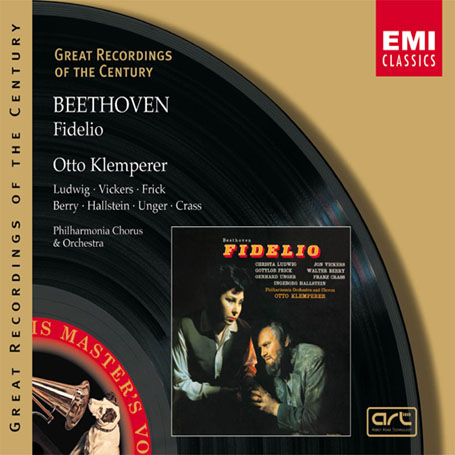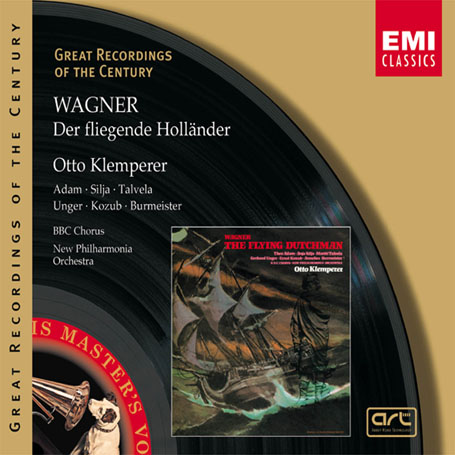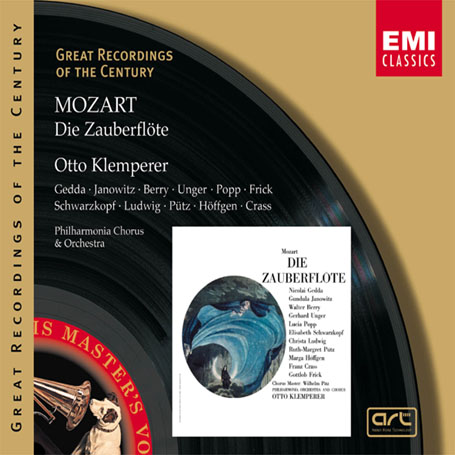Wagner Der fliegende Holländer / Beethoven Fidelio / Mozart Die Zauberflöte
A highly atmospheric Hollander – among the best sets on CD – and a classic, metaphysical Fidelio overshadow a Zauberflote that is interesting but scarcely ‘Great’
View record and artist detailsRecord and Artist Details
Composer or Director: Ludwig van Beethoven
Genre:
Opera
Label: Great Recordings of the Century
Magazine Review Date: 10/2000
Media Format: CD or Download
Media Runtime: 143
Mastering:
ADD
Catalogue Number: 567364-2

Tracks:
| Composition | Artist Credit |
|---|---|
| Fidelio |
Ludwig van Beethoven, Composer
Christa Ludwig, Leonore, Soprano Franz Crass, Don Fernando, Bass Gerhard Unger, Jaquino, Tenor Gottlob Frick, Rocco, Bass Ingeborg Hallstein, Marzelline, Soprano Jon Vickers, Florestan, Tenor Kurt Wehofschitz, First Prisoner, Tenor Ludwig van Beethoven, Composer Otto Klemperer, Conductor Philharmonia Chorus Philharmonia Orchestra Raymond Wolansky, Second Prisoner, Bass Walter Berry, Don Pizarro, Baritone |
Composer or Director: Richard Wagner
Genre:
Opera
Label: Great Recordings of the Century
Magazine Review Date: 10/2000
Media Format: CD or Download
Media Runtime: 152
Mastering:
Stereo
ADD
Catalogue Number: 567408-2

Tracks:
| Composition | Artist Credit |
|---|---|
| (Der) Fliegende Holländer, '(The) Flying Dutchman' |
Richard Wagner, Composer
Anja Silja, Senta, Soprano Annelies Burmeister, Mary, Contralto (Female alto) BBC Chorus Ernst Kozub, Erik, Tenor Gerhard Unger, Steersman, Tenor Martti Talvela, Daland, Bass New Philharmonia Orchestra Otto Klemperer, Conductor Richard Wagner, Composer Theo Adam, Holländer, Baritone |
Composer or Director: Wolfgang Amadeus Mozart
Genre:
Opera
Label: Great Recordings of the Century
Magazine Review Date: 10/2000
Media Format: CD or Download
Media Runtime: 134
Mastering:
ADD
Catalogue Number: 567388-2

Tracks:
| Composition | Artist Credit |
|---|---|
| (Die) Zauberflöte, '(The) Magic Flute' |
Wolfgang Amadeus Mozart, Composer
Agnes Giebel, First Boy, Soprano Anna Reynolds, Second Boy, Soprano Christa Ludwig, Second Lady, Soprano Elisabeth Schwarzkopf, First Lady, Soprano Franz Crass, Speaker; Second Armed Man; Second Priest, Bass Gerhard Unger, Monostatos; First Priest, Tenor Gottlob Frick, Sarastro, Bass Gundula Janowitz, Pamina, Soprano Josephine Veasey, Third Boy, Mezzo soprano Karl Liebl, First Armed Man, Tenor Lucia Popp, Queen of Night, Soprano Marga Höffgen, Third Lady, Mezzo soprano Nicolai Gedda, Tamino, Tenor Otto Klemperer, Conductor Philharmonia Chorus Philharmonia Orchestra Ruth-Margret Pütz, Papagena, Soprano Walter Berry, Papageno, Baritone Wolfgang Amadeus Mozart, Composer |
Author: Alan Blyth
Hazy discs made during his often turbulent time in Budapest show him in more agile (indeed often electrifying) form than on EMI; for example, Pizarro’s aria in Hungary is so fast the singer can hardly cope with the pace, while with Walter Berry on EMI the tempo is more sober. This may not have anything to do with the ageing process: it is just as likely to be the result of the conductor’s notorious changes of mood caused by his manic-depressive condition.
Although the majority of speeds in the Mozart and Beethoven here are measured, they are not all slowly inclined. The Hollander, the last of the three to be recorded, is anything but a staid performance. Indeed, it is the most exciting and worthwhile of the three (although conventional opinion awards that accolade to Fidelio). I attended a Festival Hall performance at the time of the sessions for the Wagner opera in which Klemperer was undoubtedly rejuvenated by the presence of Anja Silja, and there is a lovely photo in this reissue of the young soprano beaming on the contented-looking, 82-year-old conductor.
As the composer would want, the sea springs out of every bar. Peter Heyworth, writing of the live event, commented: ‘From the opening bars of the Overture, one was plunged into a world where man was at the mercy of wind and water, and against this tumultuous background there unfolded a story, not of cosy sentimentality and true love, but of an obsessive and self-destructive passion that can only be consummated in annihilation.’ William Mann, writing about the discs in Opera on Record (Hutchinson: 1979), was equally enthusiastic – you’ll find his long, astute paean in the notes here. I have often seconded those views in these pages. Silja, Adam, Talvela et al make it one of two or three great readings of the score on CD.
If you accept Klemperer’s broad, metaphysical view of Fidelio, his account of Beethoven’s only opera is also a classic. On its own terms it is superb, as are the Philharmonia’s playing and the recording, but – as I wrote in my Collection article on the work (1/97) – it lacks the theatrical intensity of some other versions, notably Maazel’s (Decca, 11/96) and Halasz’s recent Naxos set (12/99). That kind of intensity is there in Klemperer’s own Budapest recording (in Hungarian on Hungaroton) and in an off-the-air recording of his 1961 Covent Garden production. Legge made the mistake of replacing Jurinac, in this 1962 set, with Ludwig, a wonderful singer but not as natural a Leonore as Jurinac. Similarly, Hotter’s raging Pizarro is not quite matched by Berry’s. Vickers’ searing, slightly sentimentalised Florestan is common to both. When Klemperer returned to Covent Garden in 1968, Silja was his Leonore, and no one who saw and heard those performances, the conductor’s operatic swan-song, will ever forget the occasion – as Richard Osborne says in his perceptive notes. He fails to point out, though – a small but important matter – that Schwarzkopf speaks Marzelline’s dialogue for Hallstein.
Returning to Klemperer’s Zauberflote a long time away from it, I found the conductor’s measured way with the score as impressive as ever. Gedda is a forthright Tamino, Popp a nonpareil of a Queen of Night, Berry an enchanting Papageno, and the small parts are admirably taken, but Janowitz, beautifully as she sings, is a detached Pamina. With the dialogue absent (Klemperer’s decision) this set gives points – and not only in that respect – to Bohm’s contemporaneous DG set, now on the company’s Originals series, although there the Pamina is again not ideal. Bohm seems just that much more of a natural Mozartian. So in this case, unlike the other two, not quite a ‘Great Recording’, but an important document for all that, and once again I noted the uniform excellence of EMI’s sound during this golden period when Suvi Raj Grubb was taking over from Legge.'
Discover the world's largest classical music catalogue with Presto Music.

Gramophone Digital Club
- Digital Edition
- Digital Archive
- Reviews Database
- Full website access
From £8.75 / month
Subscribe
Gramophone Full Club
- Print Edition
- Digital Edition
- Digital Archive
- Reviews Database
- Full website access
From £11.00 / month
Subscribe
If you are a library, university or other organisation that would be interested in an institutional subscription to Gramophone please click here for further information.




